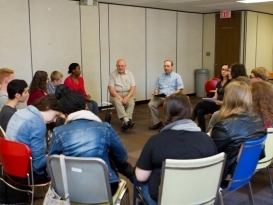Why Study the Holocaust?
“I should like someone to remember that there once lived a person named David Berger.”
David Berger, Vilna 1941
Countless students and educators have discovered that studying and teaching the Holocaust can be a transformative learning experience. Such study necessitates delving into the behavior of individuals and how they acted and reacted during one of the darkest periods in the history of humanity. For many, understanding the range of human behaviour represented by the categories of Victim, Bystander, Perpetrator and Rescuer makes the Holocaust a story for all of humanity.
The complex issues that accompany a study of the Holocaust encourage students to think critically about important issues and values not only within the historical context of the Holocaust, but also in contemporary society. The Holocaust aptly demonstrates the fragile nature of democratic institutions, inclusion and even citizenship. It challenges students to develop their participation in our own democratic institutions. The legacy of the Holocaust is the call to foster a caring and responsible society that respects its citizens.
The study of the Holocaust allows numerous entry points for learning across multiple disciplines. Students and teachers of History, World Religions, Writer’s Craft, Language Arts, English Language Development, and Civics and Social Responsibility are just some of the areas of study that have successfully incorporated the Holocaust into their learning activities. Studying the Holocaust is about studying people, real-life individuals caught up in the destructive whirlwind of Nazi aggression. It is this human element and the poignancy of the individual narrative that compels one to study and to remember, so that “Never Again” becomes a reality.
